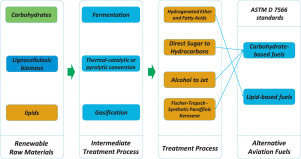当前位置:
X-MOL 学术
›
Prog. Energy Combust. Sci.
›
论文详情
Our official English website, www.x-mol.net, welcomes your feedback! (Note: you will need to create a separate account there.)
Biomass-derived aviation fuels: Challenges and perspective
Progress in Energy and Combustion Science ( IF 29.5 ) Pub Date : 2019-09-01 , DOI: 10.1016/j.pecs.2019.04.004 Meng Wang , Raf. Dewil , Kyriakos Maniatis , John Wheeldon , Tianwei Tan , Jan Baeyens , Yunming Fang
Progress in Energy and Combustion Science ( IF 29.5 ) Pub Date : 2019-09-01 , DOI: 10.1016/j.pecs.2019.04.004 Meng Wang , Raf. Dewil , Kyriakos Maniatis , John Wheeldon , Tianwei Tan , Jan Baeyens , Yunming Fang

|
Abstract The worldwide utilization of fossil energy, including its specific application as transportation fuel, significantly contributes to the continuous increase of the atmospheric CO2 concentration. Several solutions have been promoted or scheduled to reduce CO2 emissions. Among these solutions, the development of renewable energy resources, such as bio-fuels, offers important advantages as promoted by several countries and institutions who disclosed their plans to partly or totally use alternative renewable energy sources in the future. For the rapidly growing aviation sector, aviation fuel derived from fossil resources is still the major available energy source. The development of renewable aviation fuel is considered to be a promising future strategy to reduce related CO2 emissions. The worldwide total aviation fuel consumption by commercial airlines increased from about 260 million m³/year in 2005 to over 340 million m³/year in 2018, and a further annual increase of about 5% is expected till 2050. Worldwide actions have hence been undertaken with respect to bio-aviation fuel production, distribution, and demonstration flying. As a relatively new topic, there are a lot of remaining challenges in technology development, fuel certification and distribution. The production technology, policy and environmental impact of bio-aviation fuel were comprehensively reviewed, including its production by the catalytic conversion of lipids, by the conversion of carbohydrates or lignocellulosic biomass, and by developing bio-refinery concepts for bio-aviation fuel production. The future reduction of CO2 emissions in the aviation sector requires an improvement of the biomass to aviation fuel production technology through the correct integration of biology, chemical engineering, and energy crops. The paper illustrates this potential integration through reviewing the current research in the production of aviation fuels from biomass, including the complete industrial chain from airplane manufacturer, aviation fuel producer and provider, airline strategies, and ongoing R&D, bearing in mind that major efforts are required to foster the development of the cost-effective production of renewable aviation fuel. The different topics of the Table of contents will be subsequently dealt with.
中文翻译:

生物质衍生航空燃料:挑战和前景
摘要 化石能源在世界范围内的利用,包括其作为运输燃料的具体应用,极大地促进了大气 CO2 浓度的持续增加。一些解决方案已经被推广或计划用于减少二氧化碳排放。在这些解决方案中,生物燃料等可再生能源的开发具有重要优势,一些国家和机构披露了未来部分或全部使用替代可再生能源的计划。对于快速发展的航空业而言,源自化石资源的航空燃料仍然是主要的可用能源。可再生航空燃料的开发被认为是减少相关二氧化碳排放的未来战略。全球商业航空公司的航空燃料消耗总量从 2005 年的约 2.6 亿立方米/年增加到 2018 年的超过 3.4 亿立方米/年,预计到 2050 年将进一步每年增加约 5%。关于生物航空燃料的生产、分配和示范飞行。作为一个相对较新的话题,在技术开发、燃料认证和分销方面仍有许多挑战。对生物航空燃料的生产技术、政策和环境影响进行了全面审查,包括通过脂质催化转化、碳水化合物或木质纤维素生物质的转化以及开发生物炼油厂概念来生产生物航空燃料。未来航空部门减少二氧化碳排放需要通过生物、化学工程和能源作物的正确整合来改进生物质到航空燃料的生产技术。本文通过回顾目前在生物质生产航空燃料方面的研究,包括飞机制造商、航空燃料生产商和供应商、航空公司战略和正在进行的研发的完整产业链,说明了这种潜在的整合,同时牢记需要做出重大努力促进具有成本效益的可再生航空燃料生产的发展。随后将处理目录的不同主题。和能源作物。本文通过回顾目前在生物质生产航空燃料方面的研究,包括飞机制造商、航空燃料生产商和供应商、航空公司战略和正在进行的研发的完整产业链,说明了这种潜在的整合,同时牢记需要做出重大努力促进具有成本效益的可再生航空燃料生产的发展。随后将处理目录的不同主题。和能源作物。本文通过回顾目前在生物质生产航空燃料方面的研究,包括飞机制造商、航空燃料生产商和供应商、航空公司战略和正在进行的研发的完整产业链,说明了这种潜在的整合,同时牢记需要做出重大努力促进具有成本效益的可再生航空燃料生产的发展。随后将处理目录的不同主题。铭记需要作出重大努力来促进具有成本效益的可再生航空燃料生产的发展。随后将处理目录的不同主题。铭记需要作出重大努力来促进具有成本效益的可再生航空燃料生产的发展。随后将处理目录的不同主题。
更新日期:2019-09-01
中文翻译:

生物质衍生航空燃料:挑战和前景
摘要 化石能源在世界范围内的利用,包括其作为运输燃料的具体应用,极大地促进了大气 CO2 浓度的持续增加。一些解决方案已经被推广或计划用于减少二氧化碳排放。在这些解决方案中,生物燃料等可再生能源的开发具有重要优势,一些国家和机构披露了未来部分或全部使用替代可再生能源的计划。对于快速发展的航空业而言,源自化石资源的航空燃料仍然是主要的可用能源。可再生航空燃料的开发被认为是减少相关二氧化碳排放的未来战略。全球商业航空公司的航空燃料消耗总量从 2005 年的约 2.6 亿立方米/年增加到 2018 年的超过 3.4 亿立方米/年,预计到 2050 年将进一步每年增加约 5%。关于生物航空燃料的生产、分配和示范飞行。作为一个相对较新的话题,在技术开发、燃料认证和分销方面仍有许多挑战。对生物航空燃料的生产技术、政策和环境影响进行了全面审查,包括通过脂质催化转化、碳水化合物或木质纤维素生物质的转化以及开发生物炼油厂概念来生产生物航空燃料。未来航空部门减少二氧化碳排放需要通过生物、化学工程和能源作物的正确整合来改进生物质到航空燃料的生产技术。本文通过回顾目前在生物质生产航空燃料方面的研究,包括飞机制造商、航空燃料生产商和供应商、航空公司战略和正在进行的研发的完整产业链,说明了这种潜在的整合,同时牢记需要做出重大努力促进具有成本效益的可再生航空燃料生产的发展。随后将处理目录的不同主题。和能源作物。本文通过回顾目前在生物质生产航空燃料方面的研究,包括飞机制造商、航空燃料生产商和供应商、航空公司战略和正在进行的研发的完整产业链,说明了这种潜在的整合,同时牢记需要做出重大努力促进具有成本效益的可再生航空燃料生产的发展。随后将处理目录的不同主题。和能源作物。本文通过回顾目前在生物质生产航空燃料方面的研究,包括飞机制造商、航空燃料生产商和供应商、航空公司战略和正在进行的研发的完整产业链,说明了这种潜在的整合,同时牢记需要做出重大努力促进具有成本效益的可再生航空燃料生产的发展。随后将处理目录的不同主题。铭记需要作出重大努力来促进具有成本效益的可再生航空燃料生产的发展。随后将处理目录的不同主题。铭记需要作出重大努力来促进具有成本效益的可再生航空燃料生产的发展。随后将处理目录的不同主题。

























 京公网安备 11010802027423号
京公网安备 11010802027423号